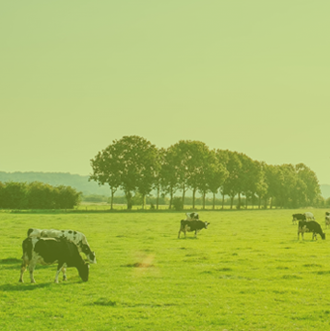RURAL AREAS
RURAL AREAS
Agriculture and nature are strongly connected but have been separated by rules and regulations for years. Agriculture has expanded exponentially, and biodiversity has dropped significantly over the past years. At the same time, farmers often do not benefit from this agricultural expansion. We work on the agricultural transition and develop business models where working with nature can also be economically advantageous: how to earn a decent living while improving biodiversity? We focus on developing models that do not depend on subsidy.
A. New business models
We develop new business models with and for entrepreneurs, mostly in the agricultural sector.
B. Policy development
How can governments accelerate the (agricultural) transition in rural areas?
Daan Groot and Erwin van Woudenberg are appointed professors “Innovative Entrepreneurship in Rural Areas” at HAS University of Applied Sciences, leading a research program aimed at developing new business models for rural areas including nature-inclusive agriculture.
Case studies
Area Quotation guide: working together for valuing farmer and landscape
In this project, we developed a manual that farmers can use to create their own rural area vision and indicate how and under what conditions they can contribute to the tasks challenges in their landscape.
Read FullNature-inclusive Investment Agenda
Nature^Squared were commissioned by the Program Office Agenda Natuurinclusief to draft the Nature-inclusive Investment Agenda. The Investment Agenda was drafted in close co-creation with stakeholders from the different domains of the Collectief Natuurinclusief.
Read FullThe Bottom Line 2023: A Business analysis into nature-inclusive livestock farming
We analysed the agricultural performance of 45 dairy farms at different stages of nature inclusiveness
Read FullPromising opportunities for soil-improving crops
How can farmers earn a good living through agriculture that also benefits the soil, climate, and nature? In this project we investigated how the soil-improving crops fibre hemp, fava bean, sorghum and oats being grown on different soils can actually achieve this.
Read FullThe costs and benefits of biodiversity restoration
In an effort commissioned by Water Board Amstel, Gooi en Vecht (AGV), we at Natursquared took stock of the (economic) advantages and disadvantages that the instalment of nature-friendly banks in the Bovenkerkerpolder, a management area of Waterschap AGV, could have. In order to reach this goal we were requested to make an estimate of the costs and benefits of nature-friendly banks and to investigate how the costs for these banks are distributed.
Read FullInnovaties in Faunabeheer
We voerden een onderzoek uit naar innovaties in faunabeheer, gericht op ganzenwering en -verjaging. De centrale vraag was welke innovatieve methoden voor ganzenwering en -verjaging beschikbaar zijn en hoe de provincie Utrecht het gebruik van innovatieve, niet-dodelijke methoden kan stimuleren, ter voorkoming van faunaschade.
Read FullOnder de streep: costs and benefits of regenerative dairy farming
We developed a method enabling the measurement of the economic performance of nature-inclusive dairy farming and applied it to a group of nature-inclusive farmers.
Read FullBiobased cultivation and building: calculating and sketching
There is an increasing demand for biobased building materials in the Netherlands. Whilst segments of the production process are already being carried out in the Netherlands, most crops and wood required are imported from abroad. The question rises: why? After all, most materials can also be produced here, and if local cultivation of crops were to become commonplace, what would this then mean for biobased construction.? What role can the production of biobased materials potentially fulfil within the Dutch agricultural landscape?
Read FullProvincial assessment of Natural Capital
Commissioned by the Province of Overijssel, Nature^Squared has researched the value and use of natural capital in the province of Overijssel.
Read FullProfessorship INNOVATIVE ENTREPRENEURSHIP IN RURAL AREAS (2017-2020)
As of 1 January 2017, Daan Groot, together with the co-founder of Nature^Squared Erwin van Woudenberg, is appointed professor on "Innovative Entrepreneurship in Rural Areas’’, a special collaboration between the HAS University of Applied Sciences and the province of Noord-Brabant.
Read FullPaying for Nature
Nature^Squared has researched the possibilities for setting up Payments for Ecosystem Services within the Netherlands.
Read FullA future for the Bovenkerkerpolder
Nature^Squared has developed several models to protect migratory meadow birds without subsidies in the Bovenkerkerpolder.
Read Full
COMPANIES & SUPPLY CHAINS
Most companies are already working on becoming more sustainable, for example by using sustainable energy sources, reducing greenhouse gas emissions and by controlling waste and efficient water usage. Although these are all relevant topic, we at Nature^Squared have developed a comprehensive model to address sustainability in an integrated manner. We distinguish 7 key themes: biodiversity, soil, climate, water use, water quality, air quality and (change of) land use. Together these themes make up a 360° perspective on sustainability when it comes to the Planet.
We assist companies with becoming truly sustainable. Our work is characterized by our pragmatic approach and our understanding of the connection between ecology and economics.
A. Sustainability policy & learning
We assist companies with developing and implementing sustainability policies regarding biodiversity and natural capital. We create a learning environment for businesses to share knowledge and experiences, and develop concrete approaches to start working with biodiversity.
B. Natural Capital Accounting
As Technical Advisor of the Natural Capital Protocol, we can support companies by mapping their connections with natural capital and biodiversity. We can do this for individual companies as well as for business sectors.
C. Our unique approaches
Next to our customized projects, we have developed two unique approaches:
Accounting for a better planet
A ready-to-use Natural Capital Assessment based on the Natural Capital Protocol. This allows any company, including SMEs, to work with natural capital.
The Short Circuit Project
A unique approach aimed at companies in Agrifood and Fashion to make an immediate positive impact on biodiversity.
Case studies
The Nature Tech Nexus: Bridging biodiversity and business
In samenwerking met de Global System for Mobile Communications Association (GSMA) hebben we de rol van mobiele en digitale Nature Tech oplossingen voor natuurbehoud en -herstel onderzocht.
Read FullE-learning course “Valuing nature and people to inform business decision-making”
This E-learning course has been developed to support learners with knowledge and skills to apply natural capital assessments and a capital approach.
Read FullTailor-made training materials on natural capital for the Food & Beverage industry
Nature^Squared realized an extensive range of training materials to aid businesses in incorporating natural capital in their operations, by documenting case studies, developing a full-day training, exploring a network analysis and designing personas to establish internal buy-in.
Read FullCommunity of Practice Business in Landscapes
I.s.m. Solidaridad en MVO Nederland faciliteren wij de Community of Practice Business in Landscapes.
Read FullBiodiversity strategy Royal A-ware
Nature^Squared has developed the biodiversity strategy of Royal A-ware, one of the largest dairy companies of the Netherlands.
Read Full
OUR UNIQUE METHODS
GREEN CITIES
Worldwide, cities are becoming the most important places for people to live and work. Not only humans are attracted to cities – many animals start to feel increasingly comfortable in urban environments. Regreening of cities and villages has, therefore, become a priority to halt the worldwide decline of biodiversity. Moreover, greening the built environment and realizing nature-based solutions is key in solving multiple societal challenges. A green environment offers an attractive business climate and stands for a healthy environment that is resilient to more extreme weather conditions. Nature is, therefore, a key component in every climate adaptation strategy. How are we going to arrange this green city of the future? And how are we going to translate the ecological benefits into monetary benefits so that together we can make this future possible?
A. Green Cities Finance Lab
What is the potential of greening cities? How can you translate inspiration into clear actions? And how do you connect with your stakeholders to achieve the desired results? Nature^Squared has vast experience in guiding meetings, brainstorms, as well as long-term projects with a focus on greener cities.
Through our interactive methods, we inspire and stimulate strategies to finance more greenery In your environment. We have developed a Serious Game in which participants have different roles and are given the assignment to realize nature-based solutions together. What do they agree on, which barriers need to be overcome, and what does this mean for realizing financial arrangements in practice?
B. Economic quickscan
Nature^Squared calculates the economic value of urban greenery. What is the economic value of an urban park or a green neighborhood? And when will green roofs recoup their costs? We calculate value of greenery by expressing the benefits in both quantitative values as well as in euros. We also look at which of these green benefits in your working area are easiest to make financial arrangements for.
C. Navigation & strategy
Are you starting a new construction project, or will there be a restructuring of a business park? Then incorporate greenery into your development plan and calculate a ‘’greener’’ scenario. We navigate organizations on a strategic level to green, urban business models. We do this by starting up long-term processes in which we do not only calculate the economic value of greenery but also set-up stakeholder management processes to arrive at financial arrangements. For such processes, we are experienced in adopting a landscape approach.
Case studies
Investeren in Integraliteit
Door de grote ruimtelijke opgaven waar Nederland voor staat in combinatie met een al zeer drukke onder- en bovengrond, is meervoudig ruimtegebruik en meervoudige waardecreatie van groot belang. Niet voor niets hanteert de Nationale Omgevingsvisie als eerste afwegingsprincipe: combinaties van functies gaan voor enkelvoudige functies. Dit rapport biedt inzicht in de complexe thematiek rond de financiering van meervoudige waardecreatie (ook wel: integraliteit) in de openbare ruimte.
Read FullNature-inclusive Investment Agenda
Nature^Squared were commissioned by the Program Office Agenda Natuurinclusief to draft the Nature-inclusive Investment Agenda. The Investment Agenda was drafted in close co-creation with stakeholders from the different domains of the Collectief Natuurinclusief.
Read FullTest Lab Tiny Houses & New Forest
In the Test Lab 'Tiny Houses & New Forest' we explore a line of thinking that offers a combined solution: how can new nature be developed through a business case of allowing tiny houses on (agricultural) land.
Read FullTEEB for cities
Nature^Squared has supported the community TEEB for cities and collaborated on the development of the web environment of the TEEB for cities tool.
Read Full
Fact Sheets
LANDSCAPE RESTORATION

Landscape restoration is the main sustainability theme for the next decade – the UN has declared 2021-2030 as “the Decade of Ecosystem Restoration”. Nature^Squared has extensive experience in the field of landscape restoration programs.
A. Design
We offer support to landscape restoration projects by connecting ecology and economy already in the design phase. This way, we help to create projects that simultaneously generate a positive socio-economic impact and ecological impact.
B. Sustainable Land Management practices
Ecosystems degrade under pressure from economic drivers. We make sure that after project ending, we have created a landscape in which economic drivers maintain and further improve the ecological landscape. We, therefore, look at yield improvement, diversification, added value creation, and connection to supply chain partners.
Case studies
The Nature Tech Nexus: Bridging biodiversity and business
In samenwerking met de Global System for Mobile Communications Association (GSMA) hebben we de rol van mobiele en digitale Nature Tech oplossingen voor natuurbehoud en -herstel onderzocht.
Read FullJustdiggit
Justdiggit is on a mission: cooling down the planet. We assist them on their mission.
Read Full
Check out our explanational video about landscape restoration
GREEN FINANCE
An increasing number of investors is looking to direct their investments towards creating positive impact, for example by contributing to the Sustainable Development Goals. In addition, there is a growing number of parties who are used to working with donor money and who are now identifying opportunities to make their projects more financially sustainable; they are investigating the possibilities of arriving at ‘bankable projects’. Yet, many sustainable entrepreneurs are struggling to find the right financing for their projects. Their projects do not fit within existing frameworks or they lack experience in implementing their business model or financing application correctly. We have extensive experience in these areas, contributing to the growing field of green climate.
A. Green Investors
We can support investment funds in evaluating their investment portfolio based on sustainability criteria or give substance to engagement processes related to natural capital or biodiversity. Moreover, we have experience in providing support in pipeline development and identifying the right project to fill.
B. Landscape finance
Although landscape restoration is often mainly financed with donor money, we are working on various financing constructions to connect private finance to landscape projects and develop ‘bankable’ business cases. Blended Finance, Outcome Payments, Payments for Ecosystem Services, First Loss, Junior Loans; these might be terms that make your head spin, but we know our way around and can help you develop creative but robust financing constructions.
C. Supporting projects
Looking for funding, but you struggle to put your proposal down on paper in the right way? We can support you.
Case studies
Investeren in Integraliteit
Door de grote ruimtelijke opgaven waar Nederland voor staat in combinatie met een al zeer drukke onder- en bovengrond, is meervoudig ruimtegebruik en meervoudige waardecreatie van groot belang. Niet voor niets hanteert de Nationale Omgevingsvisie als eerste afwegingsprincipe: combinaties van functies gaan voor enkelvoudige functies. Dit rapport biedt inzicht in de complexe thematiek rond de financiering van meervoudige waardecreatie (ook wel: integraliteit) in de openbare ruimte.
Read FullThe Nature Tech Nexus: Bridging biodiversity and business
In samenwerking met de Global System for Mobile Communications Association (GSMA) hebben we de rol van mobiele en digitale Nature Tech oplossingen voor natuurbehoud en -herstel onderzocht.
Read FullNature-inclusive Investment Agenda
Nature^Squared were commissioned by the Program Office Agenda Natuurinclusief to draft the Nature-inclusive Investment Agenda. The Investment Agenda was drafted in close co-creation with stakeholders from the different domains of the Collectief Natuurinclusief.
Read FullDe katalysatie van financiering en verzekering van Nature Based Solutions (NbS)
Met het oog de niet eerder waargenomen teloorgang aan biodiversiteit en de toenemende gevolgen van de klimaatcrisis die overal ter wereld voelbaar zijn, is er radicale actie nodig om de natuur te behouden en te beschermen, over te stappen op duurzamere productie- en consumptiemodellen en een natuurpositieve en emissievrije toekomst tegemoet te gaan. Op de natuur gebaseerde oplossingen bieden mogelijkheden om milieu- en sociale uitdagingen, waaronder natuurgerelateerde financiële risico's, effectief aan te pakken. Hoewel de betrokkenheid van de private sector is toegenomen, blijven op de natuur gebaseerde oplossingen ernstig ondergefinancierd, omdat er vragen blijven bestaan over hoe deze projecten kunnen worden gestructureerd, financieel rendement kunnen opleveren en met succes kunnen worden opgeschaald.
Read FullBankable Blueprint Book – Investing in nature & climate solutions
There are great challenges as a result of climate change and biodiversity loss. Unfortunately, there is still a huge gap between the funding needed for nature and climate projects and the actual investments.
Read Full







